Egypt Facebook page raises hopes for missing children
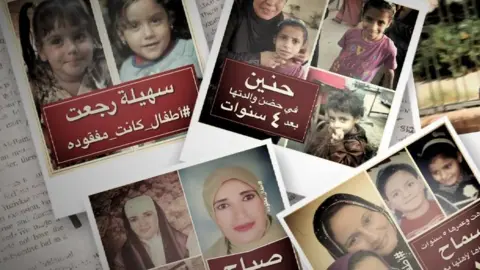 Missing Children/Atfalmafkoda
Missing Children/AtfalmafkodaIn 2009, six-year-old Mostafa accompanied his mother on a visit to her sister in Cairo. But what was meant to be a one-day trip away from his hometown in northern Egypt turned into over seven years of agony, despair and very little hope.
On the way to his aunt's house in one of the capital's most populated neighbourhoods, Mostafa's mother started to feel unwell. She gave the little boy money to buy her a bottle of water from a kiosk while she sat down to rest.
What happened next is based on what passers-by told Mostafa's father, Abdallah, after he came to find his wife in hospital.
Abdallah, a retired accountant, says he received a phone call telling him that his wife had lost consciousness. He rushed to the clinic, a three-hour drive away, to be with his wife and son.
His wife was there, but there was no boy. No child had been with her when she was admitted, he was told.
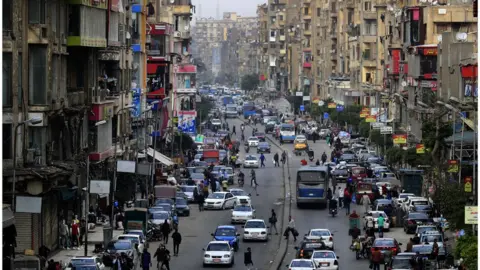 Getty Images
Getty Images"This was the beginning of near eight years of suffering," Abdallah says.
"The people who took my wife to the hospital had found her unconscious on a chair in the street. It seems that as soon as Mostafa left to get her water, she fainted - then people gathered and moved her to the hospital without realising she had a kid with her," he says.
"I rushed to the local police station to file a report that my son was missing, only to be asked to file that report in my hometown. I rushed back there but they told me I had to wait 48 hours.
"I felt helpless."
In fact, by law Abdallah should have been able to file the report on the same day and in the local police station, where his son had gone missing.
To make matters worse, as soon as Mostafa's mother left hospital and learnt that her son had gone missing she suffered a stroke and was paralysed as a result.
"She was overwhelmed with a feeling of guilt. She died a year later," Abdallah says.
"In that year, I was trying to save both: my son and my wife.
"I was moving from one hospital to another trying to treat her and going from one police station to another trying to find him."
'Police reports burnt'
In 2011, Egypt underwent tumultuous change when mass protests forced the resignation of long-time President Hosni Mubarak. But for Abdallah, what happened in those days was a disaster.
During the demonstrations, several police stations were stormed and set on fire.
"Police reports were burnt, including my son's," Abdallah says.
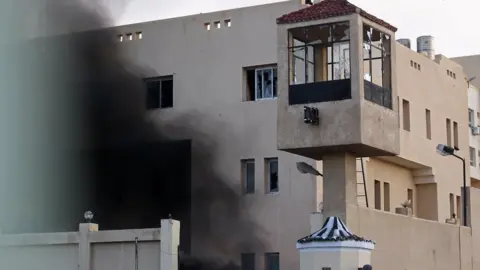 AFP
AFPHe recalls the 2011 protests with a grudge. "These events harmed me personally," he says.
In 2011 and 2012, Egypt went through a period of instability with waves of protests calling for the post-Mubarak transitional period to be accelerated.
Then in 2013 another series of demonstrations took place against the rule of late Islamist President Mohamed Morsi, leading to his ousting that July; only one year after he had assumed power. Morsi's ousting led to protests and sit-ins by his supporters that were dispersed by force in August 2013.
According to Abdallah, because of years of political upheaval, it took until 2014 for him to be able to file new police reports about Mostafa's disappearance.
As time passed, Abdallah started to lose hope of finding his son. Then something unexpected happened.
"One day, I came across a page on Facebook called Missing Children," he says.
"I got in touch with the administrator and sent my son's picture to post it on the page. I had very little hope but did it anyway."
Missing Children was launched in mid-2015 to raise awareness of the issue by posting pictures of lost children and their stories.
The page's founder is 43-year-old engineer Rami el-Gebali.
"When I started it, my aim wasn't to find these children," he says.
The first time a child was discovered through the page, it happened by chance, but it prompted Mr Gebali to change its mission from drawing attention to actively trying to find missing children.
"A few months after we started, I was contacted about one of the pictures, which was of a missing special needs boy. The caller claimed the boy in the photo slept in front of the block where he lived," Mr Gebali recalls.
"I didn't believe him until he sent me a picture of the boy. I contacted the boy's mother and she confirmed it was him."
'I stopped believing'
After Mostafa's picture was posted on the page in July 2015, Abdallah says people started claiming to have seen him in different places. Every time someone mentioned seeing him somewhere, Abdallah would drive to that place and spend the whole day looking for him but in vain.
"Every time the picture was posted, new people started claiming to have seen him. But I stopped believing them," Abdallah says.
"Then on 26 May 2016, I received a phone call from the wife of the page's founder, telling me they found Mostafa. She was over the moon."
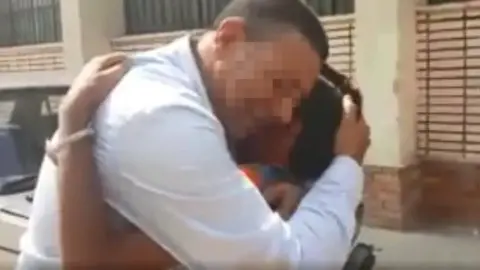 Missing Children/Atfalmafkoda
Missing Children/AtfalmafkodaAn employee at a foster care institution had gotten in touch with Missing Children and asked them to send someone to see if any of the youngsters at the facility matched any of its pictures.
"We sent someone to check and when she saw Mostafa, his name and the date he was admitted to the centre rang a bell," Mr Gebali says.
"We tried to check as much details as possible to verify his identity before getting in touch with the dad."
At first Abdallah was sceptical.
"Although I was assured that they had verified his identity, I still couldn't believe it," Abdallah says.
"I asked them to send me a picture [of the boy]. But his looks had changed."
However, Abdallah had kept one piece of information secret to use as a conclusive evidence of his son's identity if he ever found him. Mostafa had a car accident when he was four and the operation left a mark above his left knee.
So Abdallah asked the page's administrators to send a picture of the boy's bare legs.
"When I saw the mark I couldn't believe it," he says.
Seven years after last seeing his son, Abdallah went to get him from the foster care centre in Giza.
"The moment I walked through the doors, it felt surreal," he recalls.
After being reunited with Mostafa, Abdallah started to piece together what had happened on that fateful day in 2009.
It transpired that when Mostafa had returned with the bottle of water for his mother, he could not see her anywhere.
"The boy started crying. Someone passing by found him and took him to the police station," says Abdallah.
"There Mostafa only said his first name. He was terrified to the extent that he couldn't talk."
The police station is about two kilometres (1.2 miles) away from where Mostafa was separated from his mother.
He was then transferred to the foster care centre.
"I don't think I would have found him if it wasn't for the Missing Children page," Abdallah says.
'Complicated process'
Rami el-Gebali describes the work of Missing Children as "a very complicated process".
"We don't just post pictures of missing children," he says. "When the page found its first missing child, his mother mentioned something intriguing: he was wearing different clothes."
This prompted Mr Gebali to start researching how many of the children are kidnapped. He found that children get abducted for five main reasons: adoption, begging, sex trade, organ trade and ransom.
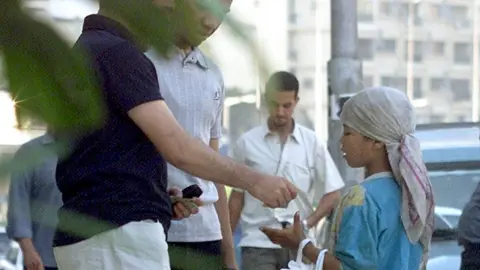 AFP
AFPHe thought that while it was difficult for ordinary people to help find children abducted for sexual exploitation, organ trade or ransom, they could actually help find those taken to join gangs of beggars or for adoption.
As a result, the page started a "No to using children as beggars" campaign in 2015.
"We asked people to take pictures of kids begging on the streets and send it to the page. We collected tens of thousands of pictures of beggars of all ages," Mr Gebali says.
A match-making process started between those missing and those begging on the street. Due to the large volume of pictures, the page started using open-source face recognition tools in late 2017.
Although the campaign led to only three children being found, thanks to it the page now has "the biggest database of missing children with pictures in Egypt," according to Mr Gebali.
The page now has 13 people working on it and has over 1.7 million followers. It also has a large network of lawyers, therapists and educators to help missing individuals and families transition back to living with each other.
It also has an impressive success rate. It says that, so far, it has found more than 2,500 missing people of all ages out of more than 7,000 cases reported to it.
But as many are found, more still go missing. According to the state-owned Al-Akhbar newspaper, police received 2,264 reports about disappeared children in 2018 and 2019.
Mr Gebali expects these numbers to drop in 2020 as a consequence of the pandemic.
"During Covid-19 we noticed almost a 30% drop in cases compared to the same period last year."
'Global database'
In 2018, Facebook selected the page as one of the top 115 most impactful initiatives on the platform.
Using a $50,000 (£38,000) grant from the social media giant, the page was able to build its own website with face recognition tools.
Capitalising on its success in Egypt, the page launched a similar one in Romania - "very similar to us, with a large number of missing people," Mr Gebali says - in 2019.
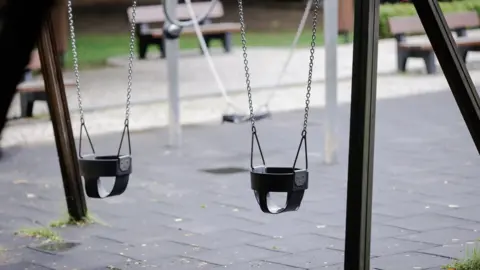 Getty Images
Getty Images"Our dream is to have one global database of missing people around the world," he says. "That way we will be able to connect the dots and confront human trafficking, organ trade, etc.
"Our motto is that no family should suffer the pain of missing a living loved one. We want to spread our model across the world. We proved the concept and we know it works."
Mostafa's and Abdallah's real names have been changed to protect their identities.
